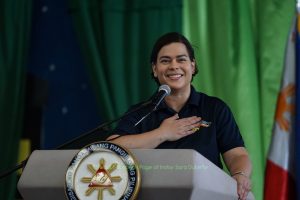Leading members of the Philippines’ House of Representatives have thrown their support behind the revival of the peace process with the country’s communist rebels, a day after Vice President Sara Duterte criticized the move as an “agreement with the devil.”
Last week, Norway’s Foreign Ministry announced that representatives of the Philippine government and the communist National Democratic Front of the Philippines (NDFP) had agreed to a “common vision for peace.” Under the agreement, the two agreed “to a principled and peaceful resolution of the armed conflict” and would seek to resolve the “deep rooted socioeconomic and political grievances” that had given rise to it.
In a statement today, leaders of political parties in the country’s House of Representatives issued a joint statement expressing their “unwavering support” for President Ferdinand Marcos Jr.’s decision to resume talks with the NDFP.
The party leaders said Marcos’ push for peace talks “transcends political boundaries and speaks to the core of our shared values as Filipinos.” They added, “We are united in the belief that through dialogue, empathy, and mutual respect, we can overcome historical divides and build a more inclusive and peaceful nation.”
The statement came in response to comments made by Vice President Sara Duterte on Monday, when she expressed her opposition to negotiations with communist rebels. “Mr. President, the government’s statement with the NDFP in Oslo was an agreement with the devil,” Duterte said during the 5th Anniversary of the National Task Force to End Local Communist Armed Conflict, of which she is the vice co-chair. She said that “we can negotiate for peace and reconciliation and pursue meaningful development efforts in the Philippines without capitulating to the enemies.”
She also questioned Marcos’ recent decision to grant amnesty to select members of the NDFP, its political wing, the Communist Party of the Philippines (CPP) and its armed wing, the New People’s Army (NPA).
Successive Philippine administrations have attempted to eradicate the NDFP insurgency, which the CPP/NPA launched in 1969. If the negotiations succeed, they will pave the way for the “transformation” of the CPP-NDF-NDF into a legal and peaceful political movement.
No talks have taken place between the NDFP and the Philippine government since 2017, when they were terminated by then-President Rodrigo Duterte, Sara Duterte’s father, after a reported NPA attack on the southern island of Mindanao. Duterte subsequently declared the group a terrorist organization and vowed its destruction.
Vice President Duterte’s comments are a rare sign of open disagreement between her and President Marcos, whose “Uniteam” ticket came to office after a landslide victory in the election of May 2022. But as columnist Mong Palatino has written in these pages in recent months, cracks in the Marcos-Duterte alliance have become increasingly apparent in 2023. Among the main subjects of contention has been Vice President Duterte’s alleged misuse of confidential funds, generally reserved for national security purposes, to support her activities as education secretary. In late September, legislators, including those allied to Marcos, voted to strip her of the funds.
Duterte supporters claimed that all of this was an attempt by House Speaker Martin Romualdez, the president’s first cousin, of seeking to undermine Duterte and bolster his own chance at the presidency in 2028. In particular, Duterte pere has been openly critical of the House’s move to block his daughter’s access to confidential funds, prompting statements of defiance and unity from Marcos allies in the legislature.
This prompted the House in early November to remove two known Duterte allies – former President Gloria Macapagal Arroyo and Davao City Representative Isidro Unga – from their deputy speakerships for refusing to sign a resolution that upheld the “dignity, integrity, and independence” of the House and the speakership of Romualdez.
Divisions have also recently emerged over the question of the ongoing International Criminal Court (ICC) investigation into President Duterte’s drug war. Duterte pulled the Philippines out of the court in anger in 2019, but Marcos said last week that authorities were looking to returning “under the fold of the ICC.”
Just how serious these divisions prove to be, and whether or not Duterte’s comments about the NDFP peace talks were an expression of an ongoing rift with the Marcos camp, remains unclear. But less than 18 months into the Marcos administration, the chances of the “Uniteam” surviving until the end of its six-year term are growing slimmer by the month.

































